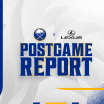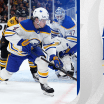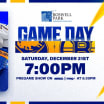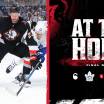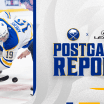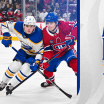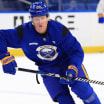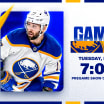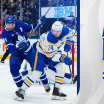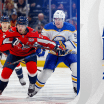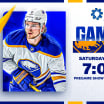Rene Robert was in a golf tournament with his friend Bernie Parent a decade or so after the Buffalo Sabres and Philadelphia Flyers met in the 1975 Stanley Cup Final. The two sat down and chatted afterwards, and Robert remembers revisiting the matchup.
"He said, 'You know what Rene, the year we beat you guys in the playoffs, that was the best hockey I played in my whole career,'" Robert recalls.
"I said, 'Thanks a lot Bernie, you had to pick that year to play us.'"
1974-75: The Final, the fog, and a lasting legacy
Alumni reflect on the 1975 Stanley Cup Final
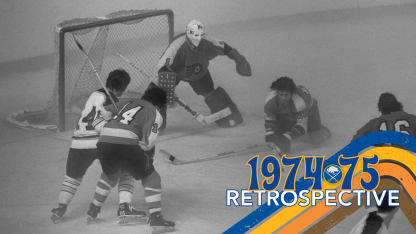
There are two beliefs that virtually every member of that 1974-75 team agree on when it comes to that series against the Flyers. The first is that the Sabres had the better team that spring - they'll say that with little hesitation. The other is that the difference was Parent, the Hall of Fame goaltender.
Of course, the series will also be remembered for its oddities - Game 3, or "The Fog Game" as it's widely remembered, has a series' worth of memorable moments on its own. Let's take a walk down memory lane to revisit the Sabres' first appearance in the Stanley Cup Final.
1974-75 Retrospective | Part 1: The team that Punch built | Part 2: Gare's unforgettable debut | Part 3: A record-setting season | Part 4: 'The fans were rocking'
The matchup
The Flyers were the defending Cup champions, having beaten Boston in six games in 1974. Parent posted a 30-save shutout in the deciding game to clinch the Conn Smythe Trophy as the most valuable player of the playoffs. He led the league in wins and save percentage and claimed his first Vezina Trophy, awarded then to the netminder who allowed the fewest goals.
Parent was similarly dominant in 1974-75. He earned the Vezina and led the league in wins once again, then he posted three shutouts in playoff series victories over Toronto and the New York Islanders.
Playing in front of Parent was the feared "Broad Street Bullies" lineup featuring a Hall of Fame captain in Bobby Clarke; offensive talents like Rick MacLeish, Reggie Leach, and Bill Barber; and legendary tough guys in Dave Schultz, Andre Dupont, and Bob Kelly.
To put those Flyers in perspective, they led the NHL that season with 1,967 penalty minutes. By comparison, second-place St. Louis had 1,275. The Sabres were a close third with 1,229.
Gare recalls meeting Schultz after he was traded to Buffalo from Pittsburgh in 1979. Gare was captain of the Sabres by then and had fought Schultz over the years. When Schultz walked into the dressing room, Gare asked, "So, you want to go again, or you want to shake my hand?" The two shook hands.
"You hated them," Gare said of the NHL in those days. "You hated everybody. That's the way it was. You hated them all."
The Sabres went 0-3-1 against the Flyers in the regular season and historically had a tough time winning at the Spectrum. That said, they say they had no fear entering the final.
"We felt we were a better team," Don Luce said. "We weren't intimidated. We could play with them physically. I think we had more skill. I think we had a much better defense."
"They had a great team with Bobby Clarke and Rick MacLeish and [Gary] Dornhoefer, you can go right down the line," said forward Jim Lorentz. "They were very good up front. … But as far as being intimidated, no, I don't think we were intimidated at all."
Sabres Memories: Remembering Rico
The Sabres outshot the Flyers, 28-22, in Game 1 at the Spectrum in Philadelphia but lost, 4-1. All five goals were scored in the third period. Robert says he remembers having three shots from about 20 feet out in that game.
"Normally out of those three, I'd score at least once," Robert said. "[Parent] stopped all of them. I turned and I looked at Gilbert and I go, 'This is going to be a long series.'"
Perreault told The New York Timesafter the game that the Sabres should have led 4-0 entering the third period. Flyers coach Fred Shero said it had been the sharpest he'd seen Parent all season.
The Flyers took Game 2 at the Spectrum, 2-1, sending the Sabres back to Buffalo with a 2-0 series deficit.
The Fog Game
The temperature in Buffalo on May 20, 1975 peaked around 82 degrees - 14 degrees higher than the historic average, according to the website Weather Underground. It was still 75 degrees by the time the puck dropped between the Sabres and Flyers for Game 3.
The temperature inside Buffalo Memorial Auditorium - which lacked air conditioning and sat upwards of 16,000 fans - was closer to 90 degrees. The result was a heavy fog that lifted up from the ice, producing the backdrop for one of the most memorable games in the history of the Stanley Cup Final.
"The game was kind of foggy and kind of embarrassing, to be honest with you," Robert said. "Kids were skating around with sheets to bring the fog down and then when you'd bring it down at one end, it'd go up at the other end. So, it was hard to breathe, it was tough skating and playing."
The New York Times reported that, due to the lack of visibility, the game had to be halted 12 times in the last 33 minutes alone. Players were given towels and asked to skate around during stoppages to help raise the fog.
"The fog would lift, and as soon as it'd lift, they'd say, 'OK, start playing again.' It was crazy," Luce said.
The game required intense concentration. A player might see a motion and have to guess whether the puck had been sent into the right or left corner.
"Where did it go?" Luce recalls thinking. "Did he pass it to me? You couldn't see very far, so you had to guesstimate a lot. It was tough to play in, very tough."
As if the fog wasn't enough of an oddity on its own, a bat could be seen flying around the Aud throughout the game. Lorentz recalls being able to tell where the bat was in the building based on the noise of the crowd. On one occasion, he remembers Parent swatting at it with his goalie stick. "It was the only thing Bernie missed in that series," he would say later.
When the bat came flying towards Lorentz, he too took a swat at it. He didn't miss.
"I don't know whether it was tired, but it was sort flying in a relatively straight," Lorentz said. "And just out of habit I reached up with my stick and it was a direct hit. The bat fell to the ice."
The Flyers' MacLeish took off his glove, picked up the bat, and tossed it into the penalty box. Danny Gare lined up for the ensuing faceoff and recalls hearing Flyers defenseman Jimmy Watson tell MacLeish he should have left his glove on since the bat could have had rabies.
MacLeish's response, according to Gare: "What's rabies?"
The game itself was a back-and-forth affair worthy of the circumstances surrounding it. The Flyers took a 2-0 lead against goalie Gerry Desjardins just 3:09 into the contest. Gare and Rick Martin scored 17 seconds apart to tie the game, but MacLeish beat Desjardins from some 30 feet out to restore the Flyers' lead going into the first intermission. At that point, Desjardins requested to be replaced by Roger Crozier.
"I felt it was in the best interest of the team," he told the media afterward.
Luce and Leach traded goals in the second period to make it 4-3 in favor of Philadelphia. Bill Hajt scored to tie the game with 10:04 remaining in the third, and the score held. The players, exhausted not only from playing in the heat but also from having to battle the fog during stoppages, were going to overtime.
We mentioned earlier this week how Robert had developed a penchant for scoring overtime goals, which he had done the series prior against Montreal. His most famous goal, if not the most famous in the history of the Sabres, came against the Flyers.
With 1:31 remaining in the overtime period, Robert came down the right side and took a shot that emerged from the fog and beat Parent low, forcing the goaltender to stumble down to the ice.
Still today, Robert chalks up the goal as a lucky break.
"It was an angle that was almost impossible to score from," he said. "I could try that thousands of times over and I would probably never. It just happened it was meant to be that the puck went into the right place, but it was pure luck Yeah, I wanted to shoot on the net, that I agree with.
"But I never knew I was going to score from there. I mean, you could try that your whole career and never score. It was just meant to be."
His teammates disagree.
"It was a great shot," Luce said. "But, you know, also he's shooting it through the fog. It was a good shot. Back then, the goalies were stand-up goalies, so he beat him on the short side. I don't know if the fog made a difference because it was such a good shot."
The Sabres won Game 4 at the Aud, 4-2, to even the series heading back to Philadelphia. Desjardins returned to the net and made 23 saves.
The legacy
The Flyers won the final two games to capture their second straight Stanley Cup championship. Game 5 at the Spectrum opened with three first-period goals against Desjardins and ended as a 5-1 win.
Crozier made his first start of the series in Game 6 and matched Parent through two scoreless periods. The Flyers took the lead on a goal from Bob Kelly scored 11 seconds into the third and went on to win, 2-0. Parent posted a 32-save shutout to earn the Conn Smythe Trophy for the second straight years
Here's how Parton Keese of The New York Times described the scene afterwards: "In the quiet Sabre dressing room, the name "Parent" was repeated often. 'Some people say Parent is lucky," said Jocelyn Guevremont, a Sabre defenseman. "But that's not luck the way he plays.'"
The players still look to Parent as the difference 45 years later.
"Bernie Parent was the difference," Luce said. "He was hot. Tough to beat. When you have a hot goaltender in a situation like that, it's tough. But we felt we were a better team. … When Bernie was hot, he was hot."
"We thought we were better than anybody," said forward Craig Ramsay. "Whether we were or not doesn't matter. You have to believe that. You don't get there without thinking you're the best. We thought we could beat anybody and wish we'd beaten them. But Bernie was special."
Sabres coach Floyd Smith told reporters afterward that his team would be back in the final. Many of his players shared that sentiment, for good reason. They were young, talented, and had impressive depth.
That group never did make it back, despite making the playoffs each year for the remainder of the seventies and finishing with 100-plus points four times. They nearly made it in 1980, but lost in the semifinal round to an Islanders team on the verge of a dynasty.
"We're all kids," Ramsay said. "We thought we'd be here year after year. It just didn't happen. Come playoff time, we would struggle. It was disheartening."
Hajt says the losses of Dudley, who left after the season for the World Hockey Association, and defenseman Larry Carriere, who was traded, left a void that was never filled.
"We thought if we could have kept that team together, we would have been there several times because we were very, very deep," he said. "Like, amazingly deep. It was so much fun to play on that team. So much fun."
"I don't have to tell you, you've got to have a perfect mix to make it all the way. We had a good team, but we had two really important missing pieces that we never got back. Because of that, we just weren't as strong."
'70s Night Video
For some, the sting of the loss in 1975 remains today, though perhaps it's overshadowed by what they gained. Those who played on the Sabres teams of the seventies grew up together as the expansion franchise took Buffalo by storm. Their wives were friends. They knew each other's children. Most remain friends today.
"I'm not taking anything away from the teams that have gone on to finals after us, but the team that we had back in '74-75, you'll never put another team like that together," Robert said.
"It was a family," added Luce.
"More like family, I guess, than a team," said the captain Schoenfeld. "So, when I think back to that 74-75 team, I think of us as such. I think it was a group of men who pulled together as a family and tried real hard to pull together to get the big prize, but just fell short."

